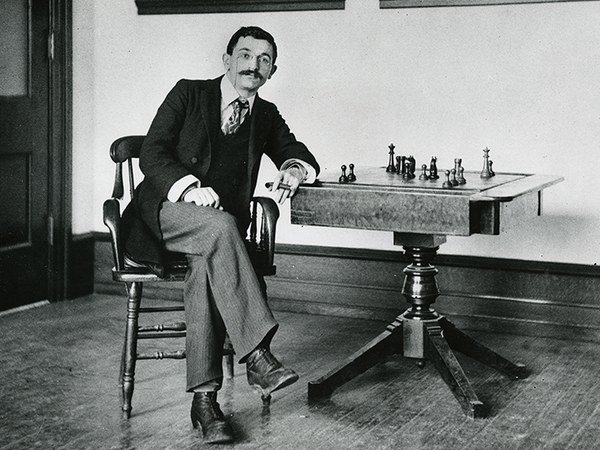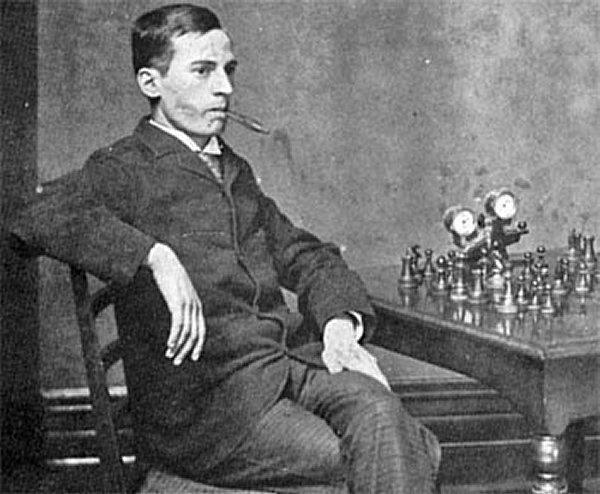


Master Class Vol.5: Emanuel Lasker
The name Emanuel Lasker will always be linked with his incredible 27 years reign on the throne of world chess. In 1894, at the age of 25, he had already won the world title from Wilhelm Steinitz and his record number of years on the throne did not end till 1921 when Lasker had to accept the superiority of Jose Raul Capablanca. But not only had the only German world champion so far seen off all challengers for many years, he had also won the greatest tournaments of his age, sometimes with an enormous lead. The fascinating question is, how did he manage that?
After winning the World Championship match against Wilhelm Steinitz in 1894 Lasker was new World Champion. But in his first tournament after winning the title Lasker was unable to show that he was also the world's best player. In Hastings 1895, he finished third behind Harry Nelson Pillsbury [pictured at right] and Mikhail Chigorin.

At the end of 1895, at the match tournament in St. Petersburg 1895/1896, Lasker played Steinitz, Pillsbury and Chigorin again. In a prestigious and long tournament: the four masters played no less than six games against each other and the winner of this tournament had good reason to claim that he was the world's best player, World Champion or not.
But Lasker did not start well and in the very first round he suffered a crushing defeat against Pillsbury. Lasker also lost the second game against Pillsbury, this time in an endgame. The third game between these two ended in a draw.
Against the other players Lasker was more successful but at the half-way mark, after 9 of 18 rounds, he was trailing Pillsbury by a full point.
| Rg. | Name | Country | Points | ||||
| 1 | Harry Nelson Pillsbury |
|
11½ | 0½½ | 111 | 6½ / 9 | |
| 2 | Emanuel Lasker |
|
00½ | 11½ | 1½1 | 5½ / 9 | |
| 3 | William Steinitz |
|
1½½ | 00½ | 011 | 4½ / 9 | |
| 4 | Mikhail Chigorin |
|
000 | 0½0 | 100 | 1½ / 9 |
In round ten Lasker had to play his fourth game against Pillsbury. And in this crucial moment Lasker showed his best chess and won a brilliant attacking game.
How to play the Queen's Gambit
Garry Kasparov took to the Queen’s Gambit at a relatively late stage of his chess career, but then had the best training anyone could imagine: in his first match for the world championship against Anatoly Karpov, this opening appeared on the board no less than 19 times. Now he shares his knowledge with you.
After this defeat Pillsbury collapsed. In the eight remaining rounds he scored only 1½, and in the end he finished third with 8.0/18. Lasker, however, finished the tournament in style and won with 11½/18. Second place went to Steinitz with 9½/18.
| Rg. | Name | Country | 1 | 2 | 3 | 4 | Points |
| 1 | Emanuel Lasker |
|
11½01½ | 00½1½½ | 1½11½1 | 11½ / 18 | |
| 2 | William Steinitz |
|
00½10½ | 1½½111 | 01100½ | 9½ / 18 | |
| 3 | Harry Nelson Pillsbury |
|
11½0½½ | 0½½000 | 11100½ | 8½ / 18 | |
| 4 | Mikhail Chigorin |
|
0½00½0 | 10011½ | 00011½ | 7½ / 18 |
With this victory Lasker showed that he was not only World Champion but also the world's best player. And he showed that crucial moments brought out the best in him.
Master Class Vol.5: Emanuel Lasker
The name Emanuel Lasker will always be linked with his incredible 27 years reign on the throne of world chess. In 1894, at the age of 25, he had already won the world title from Wilhelm Steinitz and his record number of years on the throne did not end till 1921 when Lasker had to accept the superiority of Jose Raul Capablanca. But not only had the only German world champion so far seen off all challengers for many years, he had also won the greatest tournaments of his age, sometimes with an enormous lead. The fascinating question is, how did he manage that?